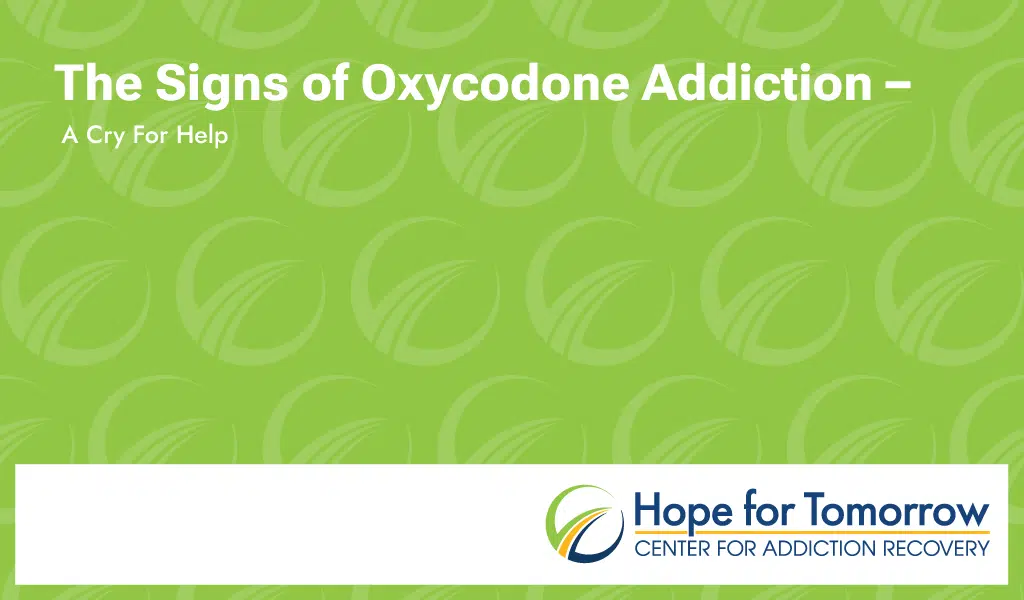Experts Reveal When Oxycodone Pain Relief Becomes Dangerous
By:
Press Advantage
July 08, 2025 at 11:34 AM EDT
Point Pleasant, WV - June 4, 2025: With opioid misuse continuing to impact West Virginia communities at one of the highest rates in the nation, understanding and recognizing the warning signs of oxycodone addiction has never been more critical than it is right now. What starts as a legitimate prescription for injury or surgery recovery can quickly spiral into dependency, especially when tolerance builds or access to continued medication becomes inconsistent. For many West Virginians, this pattern has become all too familiar, with overdose rates in rural communities climbing year after year. As the opioid crisis evolves, many families are left attempting to identify the difference between short-term pain management and a developing substance use disorder, often not realizing there’s a problem until after a crisis occurs.
Hope for Tomorrow, a trusted behavioral health provider based in Point Pleasant, has released a new community resource designed to bridge that gap. The guide, published on their blog, outlines how to spot the subtle but serious signs of oxycodone dependency – including shifts in behavior, mental health red flags, and changes in daily responsibilities or hygiene. This blog also points out, “an oxycodone use disorder not only impacts your physical health, but it can also affect your mental and emotional well-being…Understanding these psychological signs can help you decide whether it may be time to seek professional help.” The article emphasizes that substance use rarely exists in isolation. Addiction often alters how people relate to others as well as to themselves: straining relationships, increasing shame, and contributing to cycles of isolation. Family members may notice their loved one withdrawing from shared activities, avoiding conversations, or becoming increasingly secretive – classic signs that emotional connection is being replaced by dependence. These social warning signs are often the clearest indicators that something deeper is going on beneath the surface. Recognizing these patterns early enables families to approach their loved ones with greater compassion, less judgment, and a deeper understanding of how to guide them toward recovery. According to the CDC, more than 75% of the nearly 107,000 drug overdose deaths in the United States in 2021 involved an opioid. Prescription opioids like oxycodone contribute significantly to early use, which can later evolve into heroin or fentanyl dependence. They also warn that prescription opioids can be addictive and dangerous, emphasizing the importance of education and early intervention. Resources like the one released by Hope for Tomorrow offer a crucial first step in helping families recognize addiction patterns before they become fatal. Without increased awareness and open conversations about the risks of medications like oxycodone, addiction will continue to devastate families and sometimes even entire communities. But with tools like this guide, paired with a growing focus on prevention and accessible treatment, the future can shift from crisis response to long-term recovery and resilience. Communities that prioritize education, reduce stigma, and provide access to early treatment are already seeing progress. With continued advocacy and local engagement, West Virginia can lead the way in creating a model of recovery that is both compassionate and effective. Hope for Tomorrow is a behavioral health provider based in Point Pleasant, West Virginia, offering compassionate, evidence-based treatment for individuals struggling with addiction and mental health challenges. The organization offers a comprehensive continuum of care, encompassing outpatient services, counseling, and support for families. With a focus on dignity, respect, and long-term recovery, Hope for Tomorrow is committed to helping individuals rebuild their lives and restore hope. "Treatment today for a brighter tomorrow." ### For more information about Hope For Tomorrow-Point Pleasant, contact the company here: More NewsView More
Golden Cross Alert: 3 Stocks With Major Upside Potential ↗
Today 17:27 EST

The Top 3 Investment Themes That Will Dominate 2026 ↗
Today 16:08 EST

Vertical’s Valo Launch: A Commercial Leap Disguised as a Dip ↗
Today 15:43 EST
Via MarketBeat

Dividend Stocks for 2026: Where to Invest as the Market Cools ↗
Today 14:45 EST
Via MarketBeat

Why Consumers Are Abandoning Chipotle, Sweetgreen and Cava ↗
Today 13:31 EST
Via MarketBeat
Recent QuotesView More
Stock Quote API & Stock News API supplied by www.cloudquote.io
Quotes delayed at least 20 minutes. By accessing this page, you agree to the Privacy Policy and Terms Of Service.
© 2025 FinancialContent. All rights reserved.
|
